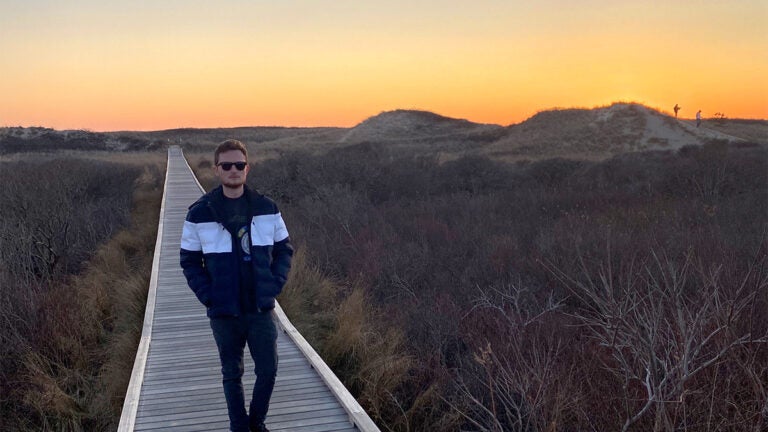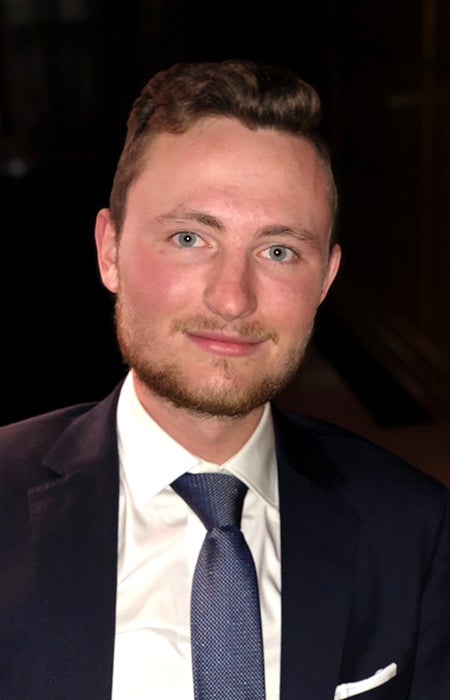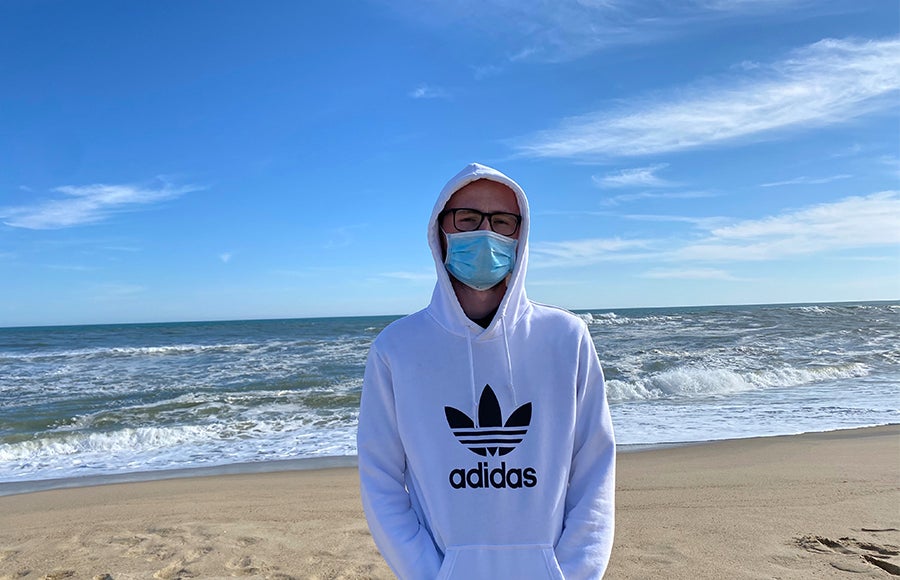
USC GOP chair Jack Patton hones his political ambitions at USC Dornsife
Los Angeles’ politics fall pretty squarely to one side of the aisle. Only 17% of voters are registered Republican. L.A. County has not had a Republican mayor since Richard Riordan left the office in 2001. The last time a Republican presidential candidate earned a majority of votes here was in 1984 when Ronald Reagan, himself a Californian, made his second run.
That hasn’t stopped USC GOP chair Jack Patton, a junior majoring in international relations at the USC Dornsife College of Letters, Arts and Sciences, from feeling at home on the USC campus, smack in the heart of an overwhelmingly liberal city. He calls USC his “dream school.”
Patton has considerable practice fitting in as a political minority. His parents are both registered Democrats and he grew up in Manhattan, which has voted for every Democratic presidential candidate since 1988. He spends his summers on Martha’s Vineyard, working at a restaurant where liberal icons like Barack and Michelle Obama dine.
These experiences have trained him to view differing political opinions with grace, a rarity in a year marked by an exceptionally divisive presidential election.
“Both parties want to help people. It’s not like one of them has malicious intentions,” says Patton. “They’re trying to make America better, they just have a different way of going about it. They have different beliefs, and there’s nothing wrong with having a different opinion.”
Eager to see bipartisan solutions make a comeback, he hopes to eventually enter politics. Once he graduates from USC Dornsife, he plans to head to law school and then jump into civic work — with big ambitions in mind.
“Ideally, I’d love to be president someday,” Patton says.
If at first you don’t succeed …
Patton knew he wanted to attend USC after a tour of campus as a high school senior. “It was a really welcoming environment, it’s a beautiful campus and it’s got great academics. It’s just fantastic. So, I applied — and I got rejected,” says Patton.
Undeterred, he enrolled at the University of Vermont and kept his sights on USC. Although the slopes near campus offered great skiing, one of his major hobbies, he felt politically marooned. There wasn’t a single conservative campus group for Patton to join.
He applied to USC as a transfer student for his sophomore year and was accepted. Elated, he headed to L.A. and immediately found like-minded students at the USC GOP club. Rigorous discussion groups hosted by the club, centered on topics like Russian election interference, health care and climate change, have helped Patton shape his political views.
“The former president of the club was heavily active in the group Young Conservatives for Carbon Dividends. I’d never really thought about that as a potential solution,” says Patton. Backed by conservatives, carbon dividends are a tax on emissions that would be returned to consumers.
An economics class at USC Dornsife introduced him to another market-based solution for climate change, “cap and trade,” in which companies are allocated a limited number of permits for carbon dioxide emissions, which they can either use or sell to other companies.

Mr. Patton heads to Washington
Timothy Turnbull, a post-doctoral scholar and teaching fellow in political science and international relations, helped put Patton on a more direct course to Washington, D.C. During his spring semester on campus, Patton took Turnbull’s course “Post-War European Relations.”
Struck by Patton’s leadership potential, Turnbull encouraged him to apply for a scholarship through the USC Dornsife Center for the Political Future’s Jesse M. Unruh Institute of Politics and wrote him a letter of recommendation.
“It’s clear upon meeting Jack that he possesses a strong work ethic and the qualities of a leader,” says Turnbull.
Patton was accepted into a summer scholarship program and interned with the U.S. State Department in the Office of Global Partnerships. The COVID-19 pandemic turned the gig into a virtual one, but the experience was still immensely valuable. “It was really great to meet all these people and see the inner workings of the government,” says Patton.
Patton was tasked with producing a guide to “hackathons,” events where computer programmers and software designers collaborate on a project with a quick turnaround time. He admits computers aren’t really his core interest, but he gamely agreed to the project.
“I interviewed members of the private sector as well as different employees of the State Department and other governmental agencies, then I ended up compiling a big report about how to best go about hosting a hackathon,” explains Patton. His amiable adaptability has paid off, with an invitation to return to the office next summer.
Minding Ps and Qs

Life on a college campus as a conservative can have its rocky moments. “I’ve definitely felt like I can’t always voice my opinion, even if it’s just a standard small government conservative opinion,” says Patton. “I’m constantly concerned about being called racist, sexist or homophobic without any merit.
“It’s really a shame that’s what conversation has shifted to. This idea that being a Republican makes you a racist is no different from saying ‘being a Democrat makes you a socialist,’” he adds.
Despite this tension, Patton continues to enjoy good-natured debates with friends who hold different political views. He encourages his peers to pursue the same.
“I think free, honest and respectful conversation is the most important thing that we’re lacking in this country right now,” he says.
Positively American
Patton believes there’s more room for across-the-aisle agreements than one might expect from inflammatory media stories and social media posts. Like his liberal peers, Patton is concerned about climate change. He’d like more market-based solutions instead of top down government decrees, however.
He also thinks there’s considerable compromise to be made on gun control. “One thing that I find a lot of Democrats agreeing with me on is the Second Amendment. I think people have the fundamental right to own guns, but I support expanded background checks,” says Patton.
When it comes to immigration, he’s interested in restrictions that echo those of our liberal northern neighbor, Canada, whose qualifications for entry are more skills-based than America’s.
Despite a pandemic and serious political division, Patton remains hopeful for the country’s future, in large part because of America’s enduring pluck.
“We always think our best days are ahead of us and I agree. I do think our best days are ahead of us. I think that kind of optimism and willpower to build that better world is incredibly powerful, and I think it’s a trait that not a lot of other countries have. That sense of positivity makes me really proud to be an American.”